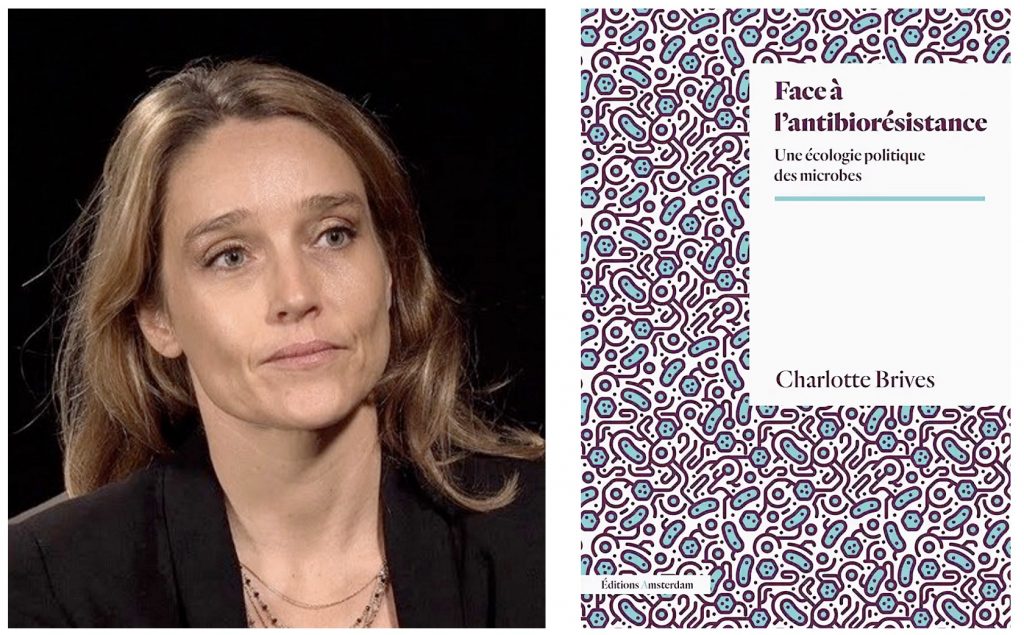The CSI Guests Seminar welcomes
Charlotte Brives
CNRS Research Fellow, Centre Émile Durkheim, Bordeaux II University
to discuss her book
Face à l’antibiorésistance
Une écologie politique des microbes

Introduction to the discussion by Allyson Pallisser
Back cover: La résistance bactérienne aux antibiotiques constitue l’un des défis majeurs de la santé publique au XXIe siècle. Mais comment la combattre ? La thérapie phagique apparaît comme une réponse possible. Cette pratique méconnue, pourtant centenaire, consiste à utiliser certaines propriétés des virus bactériophages, « mangeurs de bactéries », pour traiter les infections bactériennes. Charlotte Brives en expose brillamment l’histoire, les difficultés et les potentialités : des malades cherchant à soigner des infections chroniques aux collectifs tentant d’établir de nouveaux cadres réglementaires, des recherches en laboratoire à la constitution d’essais cliniques, c’est toute la complexité et la variété des relations entre humains, phages et bactéries qu’elle met au jour.
Il ne s’agit plus, en effet, de contrôler et de maîtriser les microbes, mais de composer avec eux. La phagothérapie, elle, respecte ces écosystèmes qu’ont dévastés les formes de production et d’exploitation des êtres vivants rendues possibles par les antibiotiques. Elle n’a certes rien d’un remède miracle, mais elle pourrait préserver les molécules chimiques encore efficaces tout en étant accessible au plus grand nombre.
Bacterial resistance to antibiotics is one of the major public health challenges of the 21st century. But how can it be combated? Phage therapy appears to be a possible answer. This little-known, yet centuries-old practice involves using certain properties of bacteriophage viruses, “bacteria eaters”, to treat bacterial infections. Charlotte Brives brilliantly outlines their history, difficulties and potential: from patients seeking to treat chronic infections to collectives attempting to establish new regulatory frameworks, from laboratory research to the setting up of clinical trials, she brings to light the complexity and variety of the relationships between humans, phages and bacteria. It’s no longer a question of controlling and mastering microbes, but of dealing with them. Phage-therapy respects the ecosystems devastated by the forms of production and exploitation of living beings made possible by antibiotics. It’s by no means a miracle cure, but it could preserve the chemical molecules that are still effective, while making them accessible to as many people as possible.
Charlotte Brives, Face à l’antibiorésistance. Une écologie politique des microbes, préface de Bruno Latour, Éditions Amsterdam, 2022.
Charlotte Brives is an anthropologist and CNRS research fellow. A life sciences and biomedicine specialist, she edited, with Matthäus Rest and Salla Sariola, With Microbes (Mattering Press, 2021) and recently published Pluribiose, Travailler avec les microbes (Éditions Quae, March 2024).
The Guest Seminar Series is organized collectively by the CSI PhD students. It is open upon registration (in-person, subject to availability).
Guest seminar 2023-2024 programme
Date: Tuesday April 30, 2024, from 11am to 1pm
Venue: Mines Paris – PSL, 60 bd Saint Michel, 75006 Paris. Room Chevalier
Registration: please fill out this form
Contact: Léone-Alix Mazaud or Allyson Pallisser
Photo credit: Charlotte Brives, Centre Émile Durkheim









